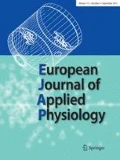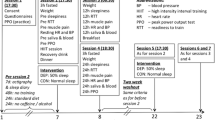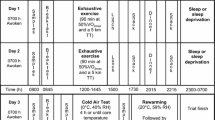Abstract
The aim was to test the hypothesis that one night of sleep deprivation will impair pre-loaded 30 min endurance performance and alter the cardio-respiratory, thermoregulatory and perceptual responses to exercise. Eleven males completed two randomised trials separated by 7 days: once after normal sleep (496 (18) min: CON) and once following 30 h without sleep (SDEP). After 30 h participants performed a 30 min pre-load at 60% \( \dot{V}{\text{O}}_{2\max } \) followed by a 30 min self-paced treadmill distance test. Speed, RPE, core temperature (T re), mean skin temperature (T sk), heart rate (HR) and respiratory parameters (\( \dot{V}{\text{O}}_{2} \), \( \dot{V}{\text{CO}}_{2} \), \( \dot{V}{\text{E}} \), RER pre-load only) were measured. Less distance (P = 0.016, d = 0.23) was covered in the distance test after SDEP (6037 (759) 95%CI 5527 to 6547 m) compared with CON (6224 (818) 95%CI 5674 to 6773 m). SDEP did not significantly alter T re at rest or thermoregulatory responses during the pre-load including heat storage (0.8°C) and T sk. With the exception of raised \( \dot{V}{\text{O}}_{2} \) at 30 min on the pre-load, cardio-respiratory parameters, RPE and speed were not different between trials during the pre-load or distance test (distance test mean HR, CON 174 (12), SDEP 170 (13) beats min−1: mean RPE, CON 14.8 (2.7), SDEP 14.9 (2.6)). In conclusion, one night of sleep deprivation decreased endurance performance with limited effect on pacing, cardio-respiratory or thermoregulatory function. Despite running less distance after sleep deprivation compared with control, participants’ perception of effort was similar indicating that altered perception of effort may account for decreased endurance performance after a night without sleep.

Similar content being viewed by others
References
Amann M, Hopkins WG, Marcora SM (2008) Similar sensitivity of time to exhaustion and time-trial time to changes in endurance. Med Sci Sports Exerc 40:574–578. doi:10.1249/MSS.0b013e31815e728f
Borg GA (1982) Psychophysical bases of perceived exertion. Med Sci Sports Exerc 14:377–381
Chen HI (1991) Effects of 30-h sleep loss on cardiorespiratory functions at rest and in exercise. Med Sci Sports Exerc 23:193–198. doi:10.1249/00005768-199102000-00008
Cunningham JJ (1980) A reanalysis of the factors influencing basal metabolic rate in normal adults. Am J Clin Nutr 33:2372–2374
Dewasmes G, Bothorel B, Hoeft A, Candas V (1993) Regulation of local sweating in sleep-deprived exercising humans. Eur J Appl Physiol Occup Physiol 66:542–546. doi:10.1007/BF00634307
Fiorica V, Higgins EA, Iampietro PF, Lategola MT, Davis AW (1968) Physiological responses of men during sleep deprivation. J Appl Physiol 24:167–176
Grandjean AC, Reimers KJ, Bannick KE, Haven MC (2000) The effect of caffeinated, non-caffeinated, caloric and non-caloric beverages on hydration. J Am Coll Nutr 19:591–600
Hessemer V, Langusch D, Bruck LK, Bodeker RH, Breidenbach T (1984) Effect of slightly lowered body temperatures on endurance performance in humans. J Appl Physiol 57:1731–1737
Kolka MA, Martin BJ, Elizondo RS (1984) Exercise in a cold environment after sleep deprivation. Eur J Appl Physiol Occup Physiol 53:282–285. doi:10.1007/BF00776603
Landis CA, Savage MV, Lentz MJ, Brengelmann GL (1998) Sleep deprivation alters body temperature dynamics to mild cooling and heating not sweating threshold in women. Sleep 21:101–108
Lee DT, Haymes EM (1995) Exercise duration and thermoregulatory responses after whole body precooling. J Appl Physiol 79:1971–1976
Martin BJ (1981) Effect of sleep deprivation on tolerance of prolonged exercise. Eur J Appl Physiol Occup Physiol 47:345–354. doi:10.1007/BF02332962
Martin BJ, Gaddis GM (1981) Exercise after sleep deprivation. Med Sci Sports Exerc 13:220–223. doi:10.1249/00005768-198104000-00002
Martin B, Haney R (1982) Self-selected exercise intensity is unchanged by sleep loss. Eur J Appl Physiol Occup Physiol 49:79–86. doi:10.1007/BF00428966
Mougin F, Simon-Rigaud ML, Davenne D, Renaud A, Garnier A, Kantelip JP, Magnin P (1991) Effects of sleep disturbances on subsequent physical performance. Eur J Appl Physiol Occup Physiol 63:77–82. doi:10.1007/BF00235173
Oliver SJ, Laing SJ, Wilson S, Bilzon JL, Walsh N (2007) Endurance running performance after 48 h of restricted fluid and/or energy intake. Med Sci Sports Exerc 39:316–322. doi:10.1249/01.mss.0000241656.22629.57
Pickett GF, Morris AF (1975) Effects of acute sleep and food deprivation on total body response time and cardiovascular performance. J Sports Med Phys Fit 15:49–56
Ramanathan LM (1964) A new weighting system for mean surface temperature of the human body. J Appl Physiol 19:531–532
Ricardo JS, Cartner L, Oliver SJ, Laing SJ, Walters R, Bilzon JL, Walsh NP (2009) No effect of a 30-h period of sleep deprivation on leukocyte trafficking, neutrophil degranulation and saliva IgA responses to exercise. Eur J Appl Physiol 105:499–504. doi:10.1007/s00421-008-0931-3
Savourey G, Bittel J (1994) Cold thermoregulatory changes induced by sleep deprivation in men. Eur J Appl Physiol Occup Physiol 69:216–220. doi:10.1007/BF01094791
Sawka MN, Gonzalez RR, Pandolf KB (1984) Effects of sleep deprivation on thermoregulation during exercise. Am J Physiol 246:R72–R77
Sawka MN, Burke LM, Eichner ER, Maughan RJ, Montain SJ, Stachenfeld NS (2007) American College of Sports Medicine position stand. Exercise and fluid replacement. Med Sci Sports Exerc 39:377–390. doi:10.1249/01.mss.0000272779.34140.3b
Weil JV, Kryger MH, Scoggin CH (1978) Sleep and breathing at high altitude. In: Guilleminault G, Dement W (eds) Sleep apnea syndromes. Liss, New York, pp 119–136
Author information
Authors and Affiliations
Corresponding author
Rights and permissions
About this article
Cite this article
Oliver, S.J., Costa, R.J.S., Laing, S.J. et al. One night of sleep deprivation decreases treadmill endurance performance. Eur J Appl Physiol 107, 155–161 (2009). https://doi.org/10.1007/s00421-009-1103-9
Accepted:
Published:
Issue Date:
DOI: https://doi.org/10.1007/s00421-009-1103-9




